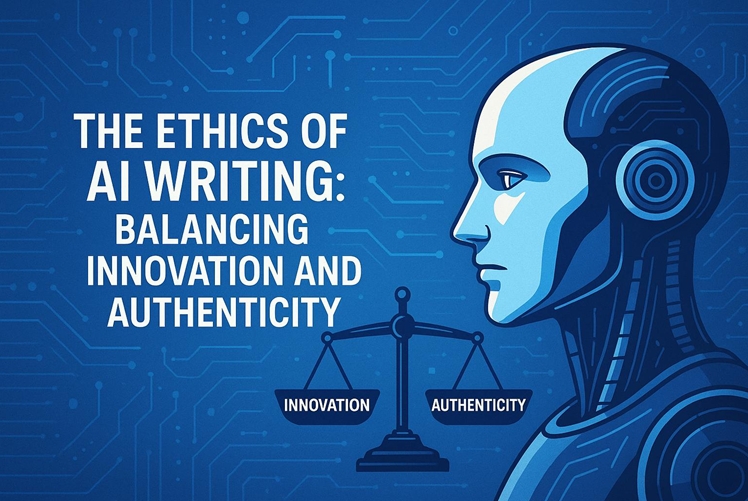
In 2025, we’re at a crossroads. 85% of content marketers plan to use AI for writing this year. That’s up from 65% in 2023. AI is becoming an ethical disaster area. 10% of biology publications are suspected of having some form of AI assistance. Large Language Model (LLM)-generated content is largely being produced by a small number of overzealous individuals. AI detection tools wrongly accuse humans more than 50% of the time!
The decision is not about whether or not we use AI. It’s whether we can do so without cremating the last vestiges of authentic human expression.
The False Positive Crisis: When Humans Are Accused of Being Machines
Vanderbilt University suspended its license for Turnitin. Its 1% false positive rate would falsely accuse 750 students of cheating a year. Stanford University found that the writing of non-native English students was falsely flagged as AI-generated more than 50% of the time.
Student “Albert” was accused of cheating because his essay included phrases like “in contrast” and “in addition to”. Award-winning and best-selling writer ReShonda Tate had her 2020 book flagged as AI-generated—despite the fact that it was published years before ChatGPT’s 2022 release.
These aren’t edge cases. These tools are configured to interpret clear, formulaic, and grammatically correct writing as suspect.
The ACLU finds that their error rate is statistically equivalent to flipping a coin. They also disproportionately target foreign students and neurodiverse learners. An autistic student failed an assignment because AI flagging tools interpreted her writing style as erratic. This isn’t just a technical error anymore. This is unethical.
This isn’t a bug in the machines. It’s a bug in using the right tools for the wrong purpose—and destroying human lives in the process.
The Real Numbers Behind AI Writing Adoption
71.7% of content marketers use it for structuring. 68% use it for ideation. 57.4% are using it to draft. GitHub Copilot users code 88% faster, and 96% of business users generate more documents per hour with AI assistance.
Those aren’t incremental productivity gains. Companies that use Generative AI consistently outperform those that don’t.
Consumers recognize it instantly. Readers noted glaring errors the moment CNET released AI-generated articles. The brand damage was immediate. Google removed 14 websites that were 90%-100% AI-generated in March 2024 alone.
The Generative AI market is going to explode. But 58% of marketers see it as job death for content writers.
Why AI Plagiarism Is More Complex Than You Think
Traditional plagiarism is simple: you steal someone else’s words.AI plagiarism isn’t so clear-cut. When you use ChatGPT to write your essay, the tool isn’t lifting sentences from a few sources you could cite. It’s learning a bunch of patterns from millions of sources that it isn’t disclosing. It looks original, but it’s not.
The lawsuits have begun. In Kadrey v. Meta, authors such as John Grisham and George R. R. Martin are suing because their copyrighted books were scraped from pirate sites and used to train LLaMA 3. There are similar suits against OpenAI and Anthropic. All of these suits are circling the same question: When a model spits out a pattern it has learned from copyrighted material, who owns the output?
If I want to, I can generate a 2,000-word AI article on climate policy in three minutes. But is that article going to contain a single original idea? The answer is a hard no. AI is capable of producing paragraphs and paragraphs of content that sounds knowledgeable without actually knowing anything.
For me, this is the inherent peril of AI writing: the authenticity deficit. It’s writing that passes all the standards while embodying nothing at all.
A Framework for Ethical AI Writing
The question we should be asking is not “should we use AI?” or “how much AI is appropriate?”. It’s “what irreducible kernel of human value are we preserving?”.
First principle: Be transparent but practical. Disclose how you used AI assistance, but don’t be stupid about it. If you used an LLM to run spellcheck, no one cares. If AI wrote 50% of your essay, your readers should know.
Second principle: Retain human ownership over insight and conclusions. The main ideas, insight, conclusions, or results of your analysis should not be AI-written. It’s fine to use AI editorially to fix sentences or improve readability.
Third principle: Fact-check, always. AI writes lies fluently. It is not okay to allow AI to generate facts without human review.
Fourth principle: Add value, don’t just amplify noise. AI is great at synthesizing and recapitulating data that already exists. It’s terrible at coming up with new ideas.
For writers who want your AI-assisted writing to be more natural, AI humanizer tools (https://www.gpthumanizer.ai/ai-humanizer) can help transform machine-written content into more authentic writing styles that you would naturally use.
The Stakes Are Higher Than You Think
When 68% of researchers think that AI will make plagiarism easier to do and harder to detect, we have a big problem. If readers can’t tell if you really know something or are just copying, why should they trust anything?
The 2024 plagiarism scandals that made the president of Harvard resign show how easy it is for AI to mess up our current systems.
Some say we need better tools to catch plagiarism. I say we need better writers. That’s when humanizing AI-written content (https://www.gpthumanizer.ai/) becomes important.
Because the truth that statistics don’t show is: when 77% of companies are using AI, and only 14% have hired an AI ethics specialist, we may be building a system that’s getting smarter before it gets wise.
Conclusion: Beyond the Binary
The ethical use of AI for writing is not a binary decision between innovation versus authenticity. Instead, it is an acknowledgment that innovation without authenticity is, in fact, just automation.
We need the efficiency gains of AI. But we also need the judgment, expertise, and creativity that turn information into understanding and writing into content.
The discipline to move forward rests on humility about what AI can do, honesty about what it can’t, and vigilance about how it’s actually being used.
The writers who thrive in this new environment won’t be the ones who use the most AI or the least. They’ll be the ones who guard what matters—original insight, genuine expertise, and authentic human voice—while using technology to expand their impact.
That’s not a compromise. It’s the only sustainable future for writing that aspires to be more than content.
Media Contact
Company Name: GPTHumanizer
Email: Send Email
Country: United States
Website: https://www.gpthumanizer.ai/




